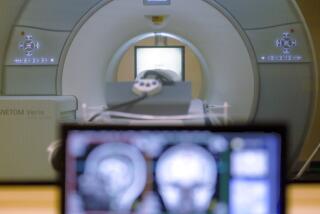Being Alive--Nicoleâs Miracle
Nicole Anguiano of Whittier wasnât expected to last long--what with the diabetes, a suspected stroke and, most of all, an inoperable, fast-growing brain tumor.
The unrelenting advance of her affliction seemed particularly out of place in a 2-year-old with beautiful brown hair and sparkling, mischievous eyes.
Her prognosis in 1988: six months to live, maybe a little more, maybe less.
But she is still here, vital and seemingly normal.
Her neurologist, Dr. Warren Cohen, wonât classify Nicoleâs survival a medical miracle. That would be premature. But her rebound was unexpected.
âItâs very, very unusual,â he said. âItâs not that sheâs unique. There are other children like her. For some reason, the growth of the tumor plateaus off. For some reason, it doesnât grow any more.â
Meanwhile, the rest of Nicole grows just fine, and the outlook appears far different from November, 1988, when more than a dozen doctors at Childrens Hospital Los Angeles clustered around the family and Nicole.
The Anguianos had brought Nicole for treatment because her eyes turned to the right one morning and more or less stayed there. And she would start to gag when she saw other people eating.
âWe had thought that the worst thing possible was that she would need glasses,â recalled Anna-Maria Anguiano, Nicoleâs grandmother.
Nicole had a tumor on her brain stem. Surgery was out of the question: Even if Nicole had left the operating table alive, a remote possibility, the brush of a surgical instrument against a nerve could disable her forever.
âYou would literally have to kill her to remove it,â Cohen said.
Radiation and chemotherapy treatments were options, but doctors said they would prolong Nicoleâs life by a matter of months at best.
The Anguianos chose steroid therapy in a bid to reduce the tumorâs swelling. And they waited.
Nicole declined. She lost her ability to walk, returned to diapers, gained weight because of the medication and grew listless.
In early February, Nicole slipped into a coma.
Just three months had passed since the original diagnoses.
When doctors could offer no hope, the family was willing to disconnect life support but chose to wait until Nicoleâs Uncle Carlos could rush back from Germany. He wanted to say goodby to Nicole, but the Army wouldnât give him emergency leave at first.
While the family waited for Carlos, Nicole lingered in a coma on life support for five days.
The family read Nicole her favorite stories and touched her so she might know they were there. No response.
Then Nicole twitched. The family called a nurse.
The nurse told them it was nothing, probably an involuntary movement. Later, the nurse saw another twitch and wasnât so sure anymore what it meant.
Amazingly, Nicole began to emerge from the coma. Doctors warned the family that she might be mentally impaired, she might not know them, she might quickly relapse into a coma and not come out again.
âDo you know whoâs talking to you,â her grandmother asked.
The child mouthed, âGrandma.â She couldnât speak the word because there was so much tubing in her mouth.
Although she had regained consciousness, the tumor continued to grow. At one point last year, it was 50% larger than when it was first spotted. It would have killed Nicole had it not mysteriously stopped swelling nine months ago.
Since emerging from her coma, Nicole has relearned how to crawl, then to walk. Finally, she started running and hasnât slowed down much since--despite having to recover from a possible stroke she suffered while in the coma and despite having to take medication to treat a form of diabetes that may be tied to the tumor.
She has also suffered two minor seizures, including one the morning of her fourth birthday party last weekend.
âSheâs rewriting history,â her grandmother said. âSheâd gone into a coma, and the doctors said she wasnât going to come out, and if she did, sheâd be a vegetable. But now she runs around and laughs and remembers everything.â
Cohen stresses that the history Nicole is rewriting is strictly her own, and worries that Nicoleâs case could give rise to false hope among parents of terminally ill children. He and the family also realize that the tumor has not gone away.







